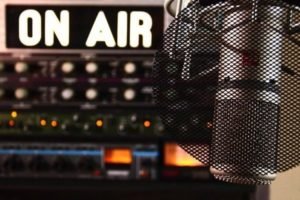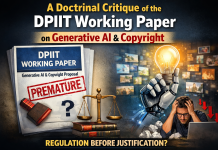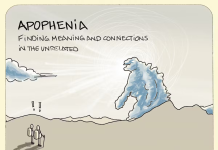The Indian Performing Rights Society (IPRS) has filed a suit in the Bombay High Court against Ushodaya Enterprises Pvt. Ltd which runs the radio channel Eenadu FM/ EFM.
The order dated December 9, 2019 states that the Interim Application is made in a Commercial IP Suit based on the rights, interests and privileges of IPRS as a performing right society. These rights and privileges are claimed under Section 33 of the Copyright Act. Read order here.
After hearing the parties at length, the Court decided that since the issue involved in the matter is an issue of law, in particular relating to the rights to be claimed under Section 33 post its amendment in 2012, the Interim Application itself may be heard finally.
The Interim Application is stood over to 21 January 2020 for final hearing.
This seems to be one of the first suits filed by IPRS against a radio broadcaster post IPRS receiving its re-registration or as a matter of fact post the Copyright Amendment Act, 2012 coming into effect.
IPRS had last year dragged Vodafone to the Calcutta High Court (Read post here) wherein the Calcutta High Court vide its order dated October 12, 2018 had directed Vodafone Idea Limited to deposit a sum of INR 2.5 crores with the HC Registrar. The order was passed in a copyright infringement suit filed by IPRS praying for a mandatory injunction directing Vodafone to remove from its Value Added Services (VAS) platform and other platforms all cinematograph films, sound recordings and the like where the underlying copyright in literary and musical works belong to IPRS, save and except their rights flowing from the sound recordings belonging to Saregama India Limited. In that case, the Court held that Vodafone ideally would be required to obtain licenses now from IPRS as IPRS has rights over ‘music and lyrics’. Vodafone had argued in that case that it had procured the license from music labels like Tips and Sony and hence it was not required to obtain a separate license from IPRS.
The Court had while ordering Vodafone to deposit the amount observed that “Whether Tips or Sony would be required to bear such liability out of the amounts received for exploitation of musical rights should not in any manner stand in the way of the society receiving its dues and share of royalty for musical exploitation and prima facie it appears that after June 2018 no effort has been made by the respondent to carry forward the discussion and arrive at a solution. The respondent cannot gain by remaining silent. If Sony and Tips does not have the right to allow the plaintiff to use such music as ringtones and such right rests with the society then any such license giving such rights in favour of the defendant would be unauthorized and cannot bind the society.”
Readers may recall that last year the Delhi High Court had dismissed the suit which was filed by IPRS against Aditya Pandey and others in 2006. Read post here. It may be relevant to reiterate the background of that dispute as the issues involved seem similar:
- In 2006, IPRS had filed a suit against Synergy Media Entertainment Ltd a company involved in broadcasting business, its Senior Manager Aditya Pandey, and others and sought permanent injunction and other consequential reliefs for infringing the copyright of IPRS. The suit was clubbed with another suit filed by IPRS and PPRS against CRI Events, an event management company which had organized an event where works comprising of the plaintiffs’ repertoire were communicated to the public.
- The main issue before the court was whether the defendants required to obtain permission only from the copyright owner of the derivative work (sound recording) to broadcast the work or additionally required a similar permission from the owner of the underlying works. IPRS submitted that when recorded music is played in public, two licenses are payable, namely, one to IPRS for performing or communicating to the public the musical composition/ lyrics and the other to PPL for communicating the sound recording of the music to the public by playing the sound recording. The Defendants relying on the 1977 IPRS vs EIMPAA case had submitted that once the author of underlying works parts with his copyrights in the making of a film or sound recording, that copyright is subsumed with the right directly flowing from Section 14(d) and (e), which entitle the copyright owner of the film or sound recording to communicate the entire film/ sound recording which includes either the entire song or part thereof to public and he cannot be compelled to pay a separate authorization or license fee to the creator of the music or the song writer.
- Justice Ravindra Bhat had vide order dated July 28, 2011 disposed of the Plaintiff’s application for temporary injunction by holding that the defendants do not have to secure a license from the plaintiff with the direction that “in case the defendants wish to perform the sound recording in public, i.e. play them, a license from PPRS is essential; in case the musical works are to be communicated or performed in the public, independently, through an artiste, the license of IPRS is essential. In case the defendant wishes to hold an event involving performances or communication of works of both kinds to the public, the license or authorization of both IPRS and PPRS are necessary. The defendant is accordingly restrained from communicating any of such works to the public, or performing them, in the public, without such appropriate authorization, or licensing pending adjudication of the suit.”
- IPRS thereafter filed an appeal against the single bench order. The division bench comprising of Justice Pradeep Nandrajog and Justice S.P Garg vide judgement dated May 8, 2012 dismissed the appeal and upheld the single bench order. The division bench of the Delhi High Court had also observed that “Had the intention of Indian legislature been that the owner of a sound recording (derivative work) should not communicate the sound recording to the public without obtaining the prior authorization of the owner of the copyright in literary and musical works (original works) or that 2 permissions had to be obtained, it should have specifically manifested such intention in the Copyright Act, 1957, as has been manifested by the legislature in the United Kingdom in the CDP Act, particularly when CDP Act, 1988 prohibits the owner of copyright in sound recording from communicating the sound recording to the public stood enacted, at the time when provision relating to copyright in sound recording was amended in India in the year 1994. Faced with such situation, it is difficult to accept the stand of IPRS that 2 separate permissions would be required.”
- An appeal was filed in the SC against the division bench order which was decided by the Supreme Court in the matter of International Confederation of Societies of Authors and Composers Vs. Aditya Pandey & Ors [Civil Appeals No.9412-9413/2014] where Justice Gogoi vide order dated September 20, 2016 dismissed the appeal and upheld the Division Bench order which had held that event organizers need not secure a separate license from lyricists and musicians for playing the song in public after it has paid for the broadcasting of the song to the sound recording company. The Court however clarified, that with effect from 21.06.2012, in view of sub-section (10) of Section 19, the assignment of the copyright in the work to make sound recording which does not form part of any cinematograph film, shall not affect the right of the author of the work to claim an equal share of royalties or/and consideration payable for utilization of such work in any form by the plaintiff/respondent.
- IPRS filed the interim application under Order VII Rule 10 for return of plaint which came up for the first time before the Delhi High Court on September 29, 2016 where IPRS argued that as per the Supreme Court judgement in IPRS vs Sanjay Dalia, the plaintiff realized that it did not have territorial jurisdiction since the suit had been filed on the basis of the plaintiff having a branch office in Delhi which is not sufficient for creating jurisdiction under Section 62(2) of the Copyright Act. IPRS further pleaded that since its principal office is in Mumbai, the plaint be returned to be presented before the Bombay High Court. Justice Rajiv Sahai Endlaw relying on Supreme Court’s decision in Harshad Chiman Lal Modi vs DLF Universal Ltd observed that there is no lack of subject jurisdiction of the court in the present case. He pointed out that there was no impediment to the court in proceeding with the suit since the defendants had given up the plea on objecting to the territorial jurisdiction of the court. Justice Endlaw further observed that it is a well settled principle of law and public policy and essential part of rule of law that a person shall not be vexed twice for the same relief. “The plaintiff, by instituting the suit in this Court has vexed the defendants in this Court and in the appeals arising from the suit, for the last twelve years, and for this reason also I am unable to find any equity in favour of the plaintiff for allowing the plaintiff to seek return of the plaint for filing the same in the High Court of Bombay. Rather, allowing the plaintiff to do so will tantamount to this Court allowing its machinery to be used improperly and permitting the process of law to be abused.” Justice Endlaw observed that the suit must be necessarily dismissed since -(i) the Plaintiff failed to lead any evidence (ii) the evidence of plaintiff having already been closed (iii) the order having attained finality and (iv) the onus of the main issues being on the plaintiff. The Court imposed costs of INR 2,00,000/- to be paid by IPRS to the defendant.
The Supreme Court in para 6 of the CISAC judgement had held that “all observations, findings and views expressed by the High Court in the original as well as appellate proceedings before it to be of no legal effect, whatsoever, in so far as the merits of the suits are concerned which will now be expedited and heard and disposed of within a year from today”. The Supreme Court’s decision was only an interim exercise by the court to find a reasonable solution to the matter which was to govern the parties until disposal of the suit. The SC had upheld the Division Bench order only as a workable solution during the pendency of the suit.
In view of the CISAC judgement, the 2011 and 2012 judgements passed by the Single and Division bench of the Delhi High Court in the IPRS vs Aditya Pandey matter have no legal effect.
The CISAC judgement had led to varied interpretations on whether dual licensing is required post 2012 Amendment or whether the decision was limited to pre-2012 Amendment. In the absence of any clarification on this point in Justice Endlaw’s judgement, the issue remained open for interpretation.
This case of IPRS vs Ushodaya Enterprises will thus be of prime importance as it would probably delve into the issues of:
- Whether dual licensing is required by radio broadcasters and consequentially by any user from owners of underlying works in addition to owners of sound recordings?
- Can royalties be paid to IPRS without obtaining a license from them?
- Who is responsible for the payment of these royalties?
Earlier this month, IPRS had filed a complaint against YRF (read post here) in furtherance of which EOW has registered the FIR against YRF.
It appears that the year 2020 will hopefully bring some clarity on issues that have been debated since the last 7+ years since the time the Copyright Amendment of 2012 came into effect.
Image source: here












